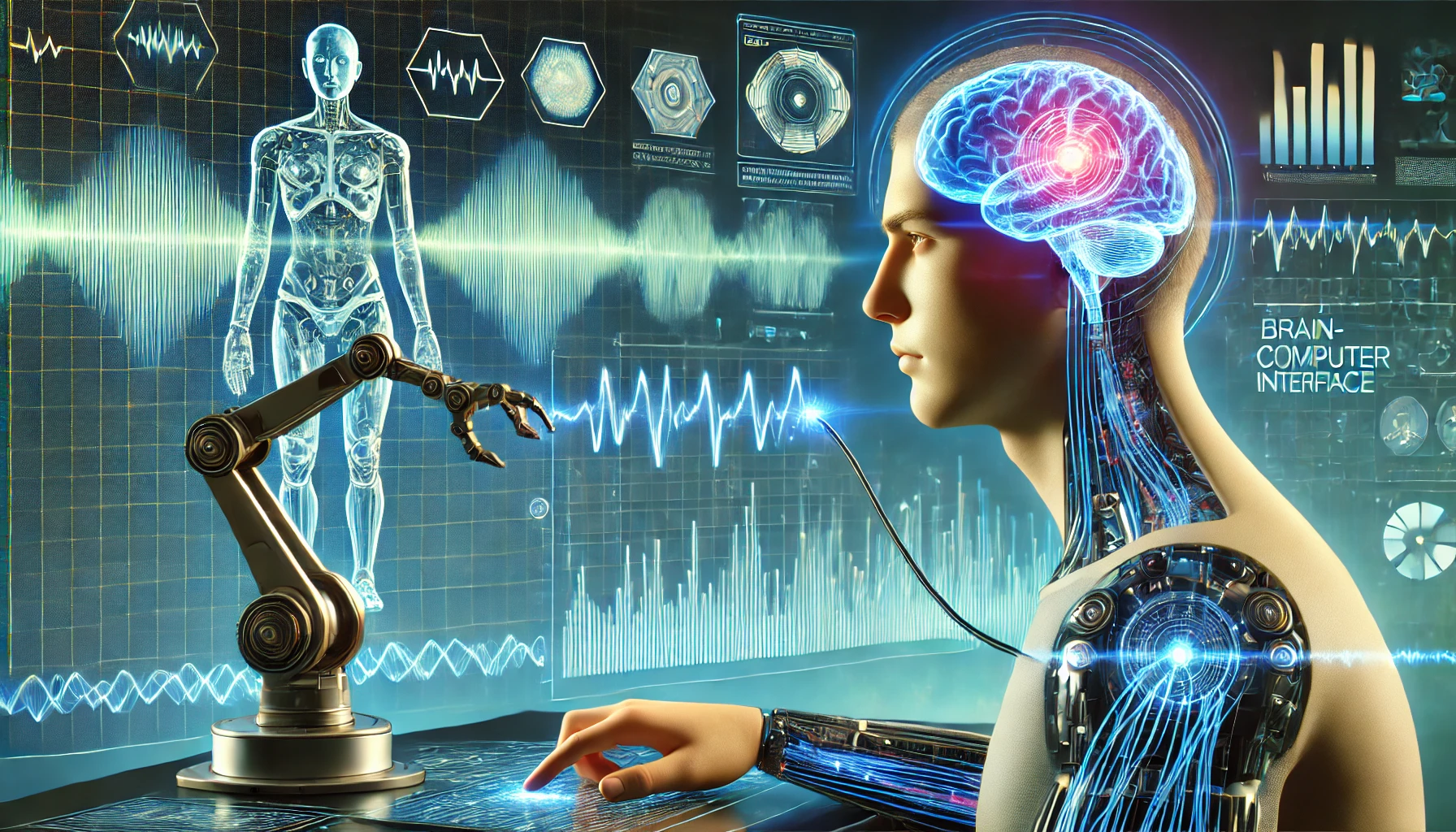Introduction:
Imagine being able to control a computer, a prosthetic limb, or even a drone just by using your thoughts. This is not science fiction; it is now a reality thanks to brain-computer interfaces (BCIs). BCIs are groundbreaking systems that enable direct communication between the brain and external devices. They can assist paralyzed patients in regaining mobility and even enhance cognitive functions in healthy individuals. The technology is advancing rapidly and holds tremendous potential for the future.

How Do Brain-Computer Interfaces Work?
BCIs function by detecting and interpreting electrical signals generated by neurons in the brain. These signals are then translated into commands that a machine can understand. The process typically involves:
Signal Acquisition: Electrodes placed on or inside the brain record neural activity.
Signal Processing: AI algorithms decode and interpret brain signals.
Command Generation: The processed data is used to control a device, such as a robotic arm, a computer cursor, or a speech synthesizer.
Types of BCIs
Invasive BCIs: Implanted directly into the brain for precise signal detection (e.g., Neuralink implants).
Non-Invasive BCIs: Use external sensors to capture brain activity (e.g., EEG caps).
Semi-Invasive BCIs: Electrodes placed under the skull but outside brain tissue.
Real-Life Examples of BCIs in Action
1. Neuralink – The Future of Brain Implants
Elon Musk’s company, Neuralink, is one of the most well-known names in BCI technology. Neuralink has successfully implanted a BCI in a human, allowing them to control a computer cursor using only their thoughts. This advancement could revolutionize how people with paralysis interact with technology.
2. BrainGate – Helping Paralyzed Patients
The BrainGate project has enabled people with severe paralysis to control robotic arms and computers using BCIs. In one case, a quadriplegic woman was able to drink coffee by moving a robotic arm with her thoughts.
3. Mind-Controlled Gaming
Companies like Emotiv and Neurable have developed EEG-based BCIs that allow users to play video games using their minds. These devices track brain activity and convert thoughts into game actions, creating immersive experiences.
4. Brain-to-Text Communication
Researchers at the University of California, San Francisco, have developed a BCI system that translates brain signals into text. This has allowed individuals with speech impairments to communicate faster than ever before.
Applications of BCI Technology
🏥 Medical & Healthcare
Restoring Mobility: BCIs help paralyzed patients control prosthetic limbs.
Treating Neurological Disorders: Used in therapies for epilepsy, Parkinson’s disease, and depression.
Communication Aid: Assists patients with ALS and other speech impairments.
🎮 Entertainment & Gaming
Mind-Controlled Video Games: Players interact using thought commands.
Immersive Virtual Reality (VR): BCIs enhance VR experiences.
Military & Defense
Controlling Drones with Thought: The military is testing BCI technology for hands-free drone control.
Cognitive Enhancement: Potential applications in soldier training and mental performance.
Challenges & Ethical Concerns
Despite its promise, BCI technology raises several ethical and technical challenges:
Privacy & Security: Brain data hacking could become a major concern.
Health Risks: Long-term effects of brain implants remain unknown.
Ethical Dilemmas: Could BCIs lead to mind control or social inequality?
The Future of BCIs
BCIs are still in their early stages, but advancements in AI and neuroscience are accelerating their development. The future could see:
Fully immersive brain-controlled computers.
BCI applications for everyday consumer technology.
Enhanced cognitive abilities through AI integration.
Conclusion
Brain-Computer Interfaces are breaking the boundaries between humans and machines, offering new ways to restore mobility, enhance cognition, and interact with technology. While there are challenges to overcome, the possibilities are endless. As research progresses, BCIs could redefine how we live, work, and communicate, merging our minds with machines in ways we once only imagined in science fiction.


